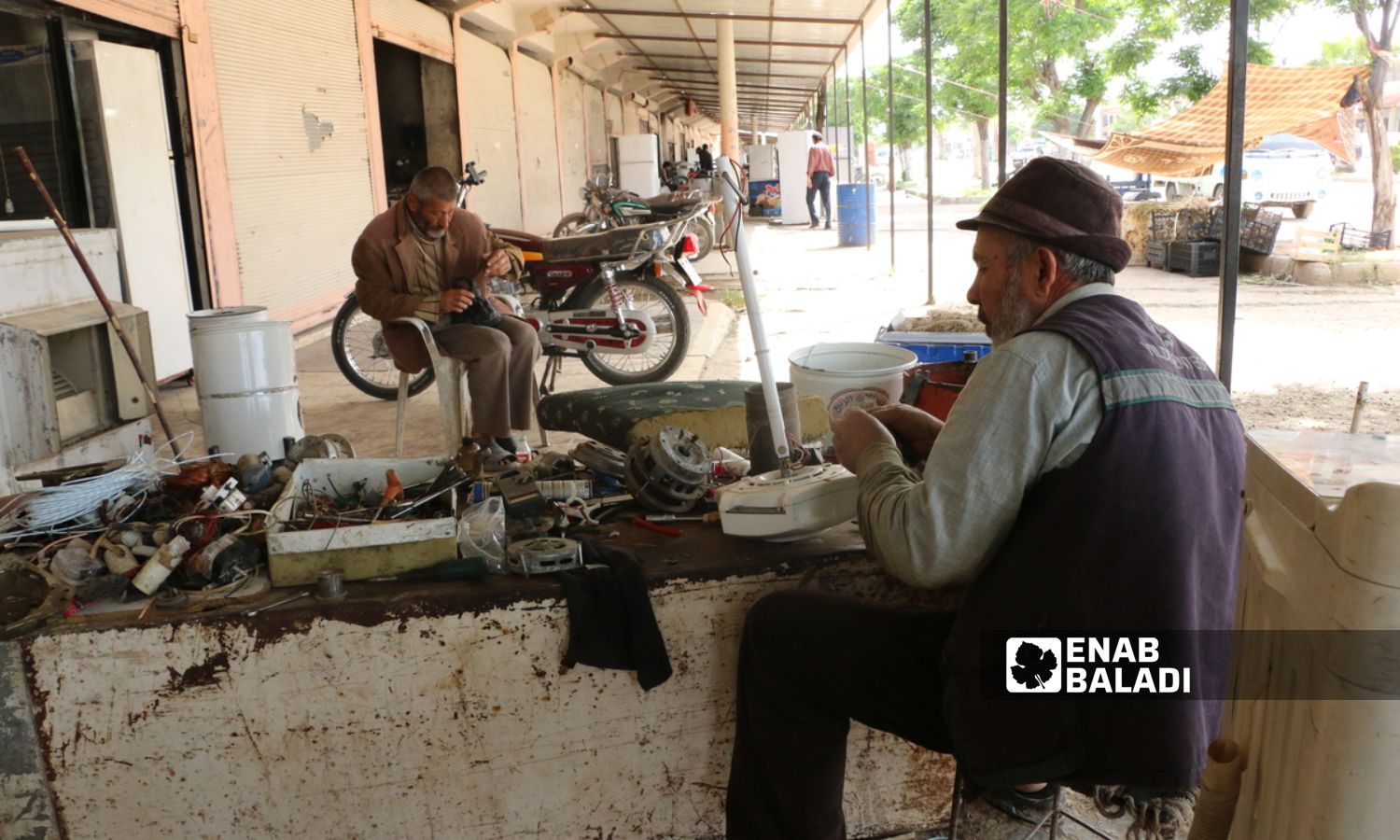



Enab Baladi – Ras al-Ain
Residents of Ras al-Ain in northwest al-Hasakah suffer frequent electrical appliance failures due to unstable electrical current and their inability to install current stabilizers.
While walking around the city, one can notice the piles of damaged electrical devices in front of repair shops, indicating the extensive damage, forcing residents to repeatedly bear the cost of repairs.
As summer approaches, the need for maintenance increases due to the essential use of electrical devices. However, the scarcity of job opportunities and low wages force residents either to borrow money or delay maintenance until they can afford the costs.
Alaa al-Din al-Salim, a resident of Ras al-Ain, mentioned that his refrigerator malfunctioned several times due to electrical current fluctuations, and the latest breakdown forced him to replace the motor, costing over 50 US dollars.
He added to Enab Baladi that repairing these faults financially burdened him, as he works in delivering orders on his motorcycle. He is considering borrowing money to buy solar panels if the electricity situation does not improve.
Meanwhile, Saber al-Murad stated that he works as a data entry clerk, but the electrical fluctuations caused significant damage to his computer’s processor.
He explained to Enab Baladi that his work was halted due to the malfunction, and noted that he would not operate his computer in the future without an electricity regulator to protect it.
He called on the electricity company to find a solution to this problem, given that most residents cannot afford to buy voltage stabilizers.
Salwa Az al-Din stated that she had been using the air conditioner for the past two weeks due to a heatwave affecting the city, but it malfunctioned after three days due to weak current.
She took it to an electrical appliance repair shop, where the owner informed her that he found damage in the electric capacitor (responsible for distributing electrical energy to the air conditioner).
Due to the high repair costs, she refrained from fixing it and is currently depending on a ceiling fan until she can afford the repair costs.
The city’s 115,000 residents primarily depend on agriculture. Day labor wages range between 30,000 to 40,000 Syrian pounds (approximately 2.5 US dollars), varying based on the number of work hours and type of job, whether agricultural or construction.
According to owners of electrical appliance repair shops in Ras al-Ain, the frequent rise and fall of voltage has become a constant issue with no solution other than relying on electricity regulators to protect these devices. However, households today do not use such devices at home due to their high prices.
Alaa Abdul Basit, a repair shop owner, told Enab Baladi that many malfunctions are due to electrical current fluctuations, pointing out that most electrical devices in Syria operate at 220 volts, and either low or high voltage leads to malfunctions.
He noted that most devices that malfunction need a stable electric current, like refrigerators and washing machines that have motors to operate them.
According to an Enab Baladi survey on the prices of electric regulators, they are divided into European, Chinese, and Turkish versions, with European being the most expensive, ranging from 70 to 200 US dollars.
Turkish electric regulators cost between 50 and 120 US dollars, while Chinese regulators start at 150 dollars for the first type, 90 dollars for the medium type, and 65 dollars for the light type.
Prices vary based on their capacity and ability to protect more devices from damage.
Ibrahim Joueid, a lawyer working with the AK Energy electric company operating in Ras al-Ain, mentioned that the main reason for current fluctuations is the old electrical networks dating back decades, making them incapable of handling the increased loads and exposing them to malfunctions and fluctuations.
He explained that the company is maintaining electrical networks in the city, but as part of a plan that prevents haphazard maintenance, it is being done gradually (area by area).
He added that maintenance operations for the network have not stopped, but it requires significant time and effort, as most of the city’s networks and electrical connections were incorrectly done, necessitating time for maintenance or even complete replacement.
He mentioned that the situation of electricity has improved in the city, where there are no longer frequent outages, and the company works to provide stable and trouble-free electricity to prevent losses for the residents.
AK Energy was founded in Kilis province, Turkey, and is owned by Syrian Ibrahim Khalil and three Turks. The company started its operations in the rural areas of Aleppo on June 1, 2017, and obtained license number “9123455” from the Chamber of Commerce and Industry in Gaziantep province, Turkey.
The company signed its first contract with the local councils in Ras al-Ain and Tel Abyad in March 2021, which included providing electrical current to the city of Ras al-Ain and its countryside, as mentioned by the former head of the local council in Ras al-Ain, Marai al-Yousef.
The contract with the local council stipulates providing power to the city and countryside within one year, but the company failed to meet the agreement as it took more than two years to fully power Ras al-Ain.
One of the main terms of the contract was to maintain the infrastructure for electricity in the city and countryside, but the infrastructure was not replaced, and instead connected randomly, still causing frequent outages due to this.
if you think the article contain wrong information or you have additional details Send Correction